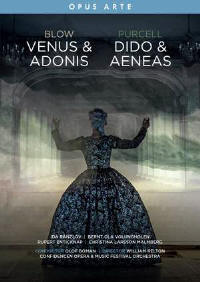Texte paru dans: / Appeared in: |
|
|
Outil de traduction |
|
|
Blow’s ‘Masque for the entertainment of the King’ was performed at court in 1683; the following year, the vocal parts suitably adjusted, it was given at Josias Priest’s boarding school for ‘young Gentlewomen’ in Chelsea. That was where the first known performance of Dido and Aeneas took place, probably in 1689; evidence is lacking, but it is possible that Dido too was first performed at court. Certainly the pieces have much in common: at a time when native opera in London meant plays with music, both are entirely without spoken dialogue. Both comprise a prologue and three acts (the music for Purcell’s prologue is lost), and include dances as well as a comic – or less serious – scene to offset the tragedy. The sets by Christer Nilsson are dominated by backcloths that are raised and lowered: a landscape will give way to Ionic columns, for example, or to Aeneas’s fleet. Anna Kjellsdotter’s costumes are formal: long dresses, wigs (18th- as well as 17th-century, I’d say) and, as an opening surprise, violent turquoise knickerbockers and red braces for Cupid. And it’s Cupid who begins Venus and Adonis by addressing his audience. How did Charles II and his court react to ‘Courtiers there is no faith in you, / You change as often as you can: / Your women they continue true / But till they see another man’? And I wonder whether the ushers at Mr Priest’s school were not dismayed by the likely effect on the gentlewomen of Adonis’s ‘Venus, when shall I taste soft delights / And on thy bosom lie?’ William Relton, the director, never puts a foot wrong. Adonis is passionate, Venus playful and, at the end, distraught. A trio of huntsmen enter with their hounds, which turn out to be toy pugs on a lead; together with Adonis they dance to Sara Ekman’s witty choreography. For the spelling lesson that Cupid gives the Little Cupids, a blackboard appears. In Dido, the Sorceress and her witches play with fans; and while the queen’s tenderness and imperiousness are portrayed as you would expect, Aeneas in his quandary – love for Dido or obedience to the gods – comes across as more sympathetic than usual. The Second Woman (Lisa Carlioth) becomes increasingly distressed as she recounts the tale of Actaeon killed by his hounds: an interruption to the idyll, presaging the sadness of the ending. The cast is excellent. Ida Ränzlöv is quite skittish as Venus, making her grief in Act 3 all the more poignant. Her cry ‘Oh, pow’rs above, take pity on the wretched Queen of Love’, underpinned by a descending chromatic bass, and her prolonged ‘Ah’ when Adonis dies, are heart-rending. Dido’s Lament is beautifully done, every phrase suffused with the warmth of Ränzlöv’s mezzo-soprano. Bernt Ola Volungholen makes a manly lover in both operas, his caddishness as Aeneas mitigated by the intensity of his phrasing. Rupert Enticknap has a high old time camping it up as Cupid and a berouged Sorceress, his countertenor soaring effortlessly to the top of the stave. The tiny chorus is made up of the other soloists: all fine, except for not being quite on the ball at ‘Haste, haste to town’ in Dido. The orchestra of period instruments – the pitch is a semitone below today’s standard – can’t be faulted. The conducting of Olof Boman is mannered in places such as, in Dido, the staccato opening to ‘Cupid only throws the dart’ or the broken-up cello introduction to the Lament. But Boman is especially good in the dances, which really go with a swing, and there’s an exquisite moment in Venus and Adonis when the Graces, silhouetted initially against a blue background, gently sing in praise of the goddess. The filming includes rather too many shots of the conductor’s arms at the bottom right of the screen; the booklet contains nothing but the casts, synopses and production photos. Such minor points should not deter you from enjoying these superb performances. |
|




